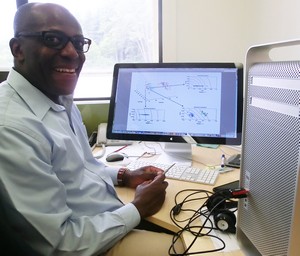Novel computing approach recognised for Scion scientist
27 June 2013
 Oliver Chikumbo, a big data scientist at Rotorua Crown Research Institute Scion, together with overseas collaborators were awarded the prestigious Wiley Practice Prize for the best practical application of the Multi-Criteria Decision Making at a Conference held in Malaga, Spain last week.
Oliver Chikumbo, a big data scientist at Rotorua Crown Research Institute Scion, together with overseas collaborators were awarded the prestigious Wiley Practice Prize for the best practical application of the Multi-Criteria Decision Making at a Conference held in Malaga, Spain last week.
Dr Chikumbo completed this research alongside Professors Erik Goodman and Kalyanmoy Deb at BEACON - a cross-disciplinary centre for the study of evolutionary systems headquartered at Michigan State University.
The prize, which is sponsored by the global academic publishing company, John Wiley & Sons Inc. for the “Journal of Multi-Criteria Decision Analysis”, is awarded every two years for the best paper describing a real-life application of multiple criteria decision making.
Multiple criteria decision making is a sub-discipline of operations research concerned with structuring and solving decision and planning problems involving multiple criteria and stakeholders. An example here is optimising land-use for a region such as the Rotorua catchment where there are many landowners who may have different views on what they want to do with their land.
The team’s winning paper tackled exactly this land-use problem – or more specifically the question of what would be the optimal land-use for a 1500ha farm in the Rotorua over the next 50 years?
They simultaneously accounted for a range of production, economic, and environmental criteria. The real breakthrough in his approach was from combining intuitive (human) judgement with genetic algorithms and epigenetic programming to derive the most optimal solutions to his problems.
“I think we made some amazing progress in how we tackle these incredibly hard problems” says Dr Chikumbo. This is an approach we have been working on consistently for the past two years, but is really the culmination of more than 20 years of work.”
About genetic and epigenetic programmes
These computer programmes are created to mimic biological natural selection. Just as a species is adapted to its environment (in biology), these programmes find solutions that best fit a problem. The application of these approaches are not confined to land-use, they can be applied to virtually any problem solving exercise such as managing traffic flows, designing cities and financial investing.
